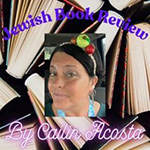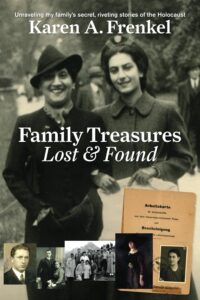Family Treasures: Lost and Found by Karen A. Frenkel; Post Hill Press; New York; © 2025; ISBN 9798888-459577; 377 pages of text plus 20 pages of appendices; $22.99.

 LA MESA, California – “All Holocaust survivors’ stories are extraordinary and precious because of the improbable odds of outwitting Hitler and escaping the Nazis’ meticulous and murderous rampages,” states Karen A. Frenkel at the beginning of her family’s stories of survival before, during, and after the Nazi invasion of Poland, including eastern cities now in present-day Ukraine. Frenkel is a journalist and used her investigative skills to sleuth out the truth.
LA MESA, California – “All Holocaust survivors’ stories are extraordinary and precious because of the improbable odds of outwitting Hitler and escaping the Nazis’ meticulous and murderous rampages,” states Karen A. Frenkel at the beginning of her family’s stories of survival before, during, and after the Nazi invasion of Poland, including eastern cities now in present-day Ukraine. Frenkel is a journalist and used her investigative skills to sleuth out the truth.
Frenkel is the youngest of three sisters born to David and Irena Frenkel. Karen mentions growing up in the New York area and having a loving family life but there were always subjects that were not discussed. David became a gynecologist to help women deliver healthy babies. Hoping to escape antisemitism at Polish universities, he studied abroad in Austria at the University of Vienna Medical School, but there Jewish students were subjected to violent antisemitic riots anyway.
He was able to flee to the United States and finish his studies and practice medicine but left many family members behind not knowing their fates. Karen was only 15 years old when David passed away, so this book served as a testament to researching her family roots and modes of survival.
Her parents only gave small snippets of their experiences as the children grew up. In 1987, Karen urged her mother to record her testimony for the Fortunoff Video Archive for Holocaust Testimonies at Yale University. In 2000, she forced herself to watch the videotape that started the script for this book. She was reluctant to research her father’s past since as a child, her mother would tell her not to bring it up as it is very painful.
Neither of her parents were sent to concentration camps. She says they were the lucky ones to survive. But they suffered tremendous loss of family members to suicide, members who died in concentration camps, and illnesses. Her parents both died young and were robbed of long happy lives as they suffered from illnesses from poor medical treatment while trying to survive and constant Post Traumatic Stress Disorder. Karen spent many years researching and contacting historians through the web.
In 2016, she took a trip with her husband to Krakow, Poland (where her mother was raised), Lviv, Ukraine (where her father was born), Vienna, Austria (where her father attended medical school), and Tarnow (where her mother went after her parents forced her to leave them in Lwow, now Lviv, where they were refugees). Karen located landmarks where her mother survived as a slave laborer and had false papers to pass as a Polish Catholic. Very few Jews survived that way. The loneliness as a teenager after being forced by her parents to leave them, toiling in Germany in constant mortal danger, and then learning that the Nazis caught both of her parents (Karen’s grandparents) and murdered them. Having to hide mourning in order to survive among enemies. Karen describes being angry about finding a landmark where Jews were hidden in the basement, and just above was a bustling, busy street. How could the passersby not hear their cries, or were they unaware of the horrors happening in the basement?
This memoir of the Frenkels took me a few weeks to read as it was very painful and emotionally disturbing. Karen mentions she also had to take mental breaks from researching or discussing Holocaust material for her own mental health. I could imagine the scenes in my head as if I were watching a film unfold. When I would take mental breaks, my thoughts would always go back to “How could this have happened?, How can someone’s hate be so strong to kill on command or always be living in fear of being killed? How could a human subject another human to forced labor, starvation, and denial of medical treatment?”
I never doubted the Holocaust happened, but when reading so many personal stories, talking with survivors, and seeing documentaries, I always step back and think, “how is this real?”
As Karen states all Holocaust stories are different. This book was very well researched which included 20 pages of family photos, maps tracing their escape routes, and family-tree diagrams. I recommend reading in parts and taking breaks as it is a lot of information to read all at once.
*
Cailin Acosta is the assistant editor of the San Diego Jewish World.